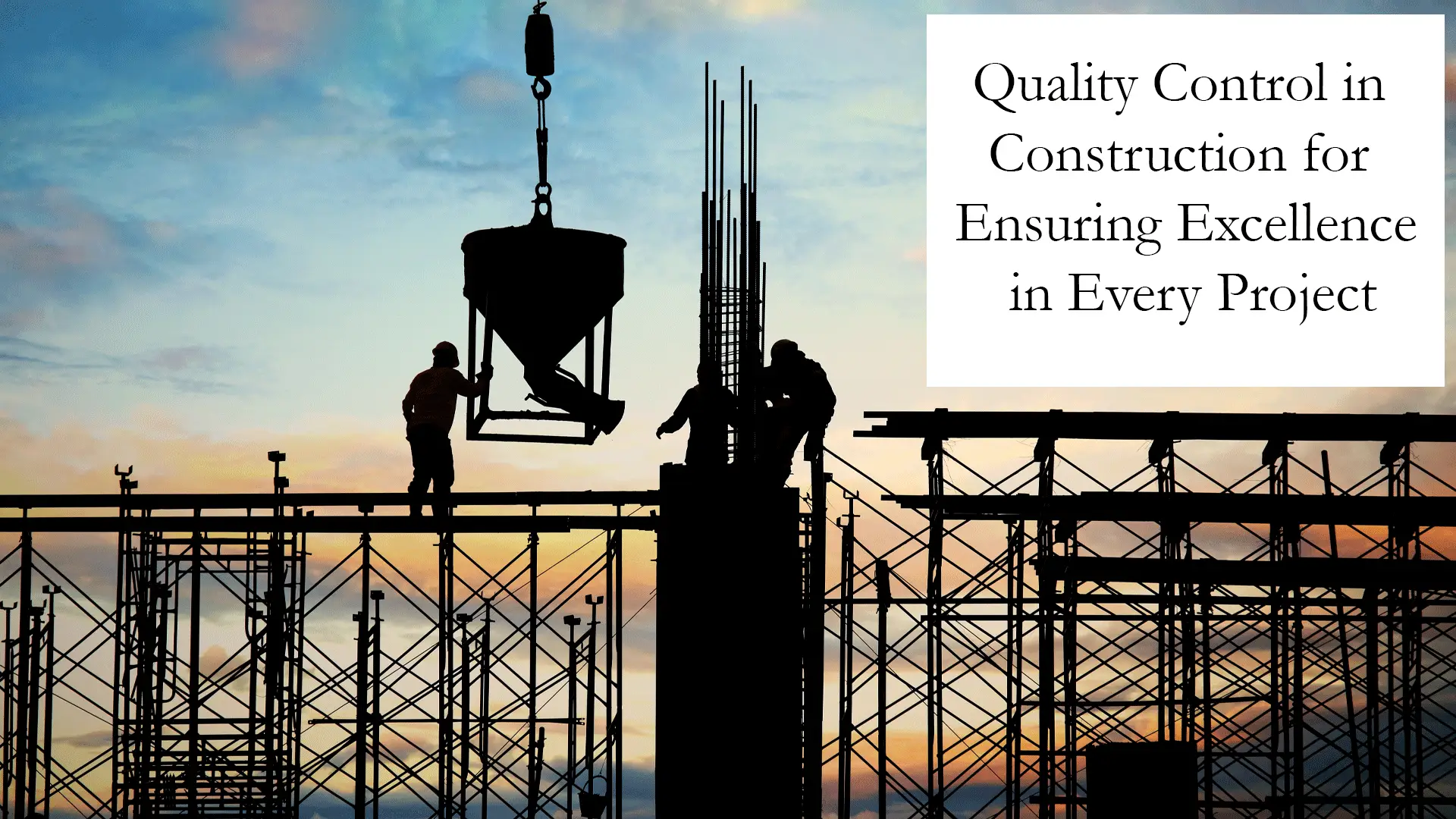In the world of construction, excellence isn’t an option; it’s the standard. Quality control is the linchpin that holds together every aspect of a construction process project, from planning and design to execution and delivery. It’s the assurance that the final result meets or exceeds expectations. In this blog, we delve into the vital role of quality control in construction and how it ensures excellence in every project.
What is Quality Control in Construction?
Quality control in construction refers to the systematic processes and measures put in place to monitor, inspect, and manage every aspect of a project to ensure it meets specified quality standards. It encompasses materials, workmanship, adherence to plans, safety, and compliance with regulations.
Why is Quality Control Important in Construction?
- Safety: Quality control helps identify potential safety hazards and ensures that construction practices adhere to safety regulations, protecting both workers and the eventual occupants of the structure.
- Cost-Efficiency: Detecting and rectifying issues early in the construction process can prevent costly rework or repairs later on. This saves both time and money.
- Client Satisfaction: Meeting or exceeding quality expectations leads to satisfied clients who are more likely to recommend your services and engage in future projects.
- Legal Compliance: Quality control ensures that all construction activities comply with local building codes, regulations, and industry standards, reducing the risk of legal issues.
- Sustainability: Quality control can help implement sustainable practices, such as using eco-friendly materials and minimizing waste, contributing to a more environmentally responsible construction process.
Key Components of Quality Control in Construction
1. Detailed Planning and Design
Quality control begins during the planning and design phases. This involves specifying project objectives, quality standards, materials, and construction methods. Detailed plans and drawings act as a blueprint for excellence.
2. Material Selection and Testing
Selecting high-quality construction materials is crucial. Quality control includes materials testing to ensure they meet the required specifications. This extends to verifying the source and authenticity of materials.
3. Skilled Workforce
A skilled and trained workforce is vital for maintaining quality standards. Regular training and certification programs ensure that construction teams are up to date with the latest techniques and best practices.
4. Inspection and Testing During Construction
Regular inspections and testing at various stages of construction help identify deviations from the design and quality standards. This includes structural inspections, electrical, plumbing, and HVAC inspections, among others.
5. Documentation
Thorough documentation of inspections, test results, and any deviations is essential. This documentation provides a clear record of the project’s quality history and helps in decision-making.
6. Quality Control Checklists
Quality control checklists outline specific criteria and standards for each phase of construction. These checklists act as a guide for inspectors and ensure consistency in evaluations.
7. Corrective Actions
When quality issues arise, a systematic process for addressing and correcting them should be in place. This includes evaluating the root cause, implementing corrective measures, and reinspection.
8. Final Inspection and Commissioning
Before handing over the completed project to the client, a final inspection and commissioning process should be conducted. This ensures that all systems are functioning correctly and that the project meets quality standards.
The Future of Quality Control: Technology and Innovation
Advancements in technology are revolutionizing quality control in construction. Drones, Building Information Modeling (BIM), and mobile apps are being used for inspections, data collection, and real-time communication. These tools enhance the accuracy and efficiency of quality control processes.
In conclusion, quality control in construction is not just a checkbox on a project’s to-do list; it’s the backbone of excellence. It’s the commitment to delivering structures that are safe, durable, efficient, and in line with the highest quality standards. It’s the assurance that every stakeholder, from builders to clients, can trust in the integrity of the construction process. With quality control as the compass, the construction industry continues to build a future defined by excellence.
FAQs
Q: What is quality control in construction, and why is it important?
A: Quality control in construction refers to the processes and measures used to ensure that a construction project meets specified quality standards. It is important because it ensures safety, cost-efficiency, client satisfaction, legal compliance, and sustainability in construction projects.
Q: What are the key components of quality control in construction?
A: Key components include detailed planning and design, material selection and testing, a skilled workforce, inspections and testing during construction, documentation, quality control checklists, corrective actions, and final inspection and commissioning.
Q: How does quality control begin in construction projects?
A: Quality control starts during the planning and design phases. This involves specifying project objectives, quality standards, materials, and construction methods. Detailed plans and drawings serve as a blueprint for quality.
Q: How are corrective actions handled in quality control?
A: When quality issues arise, a systematic process is followed. This includes evaluating the root cause, implementing corrective measures, and reinspection to ensure that the issue has been resolved.
Q: What is the final inspection and commissioning process in construction quality control?
A: Before handing over the completed project to the client, a final inspection and commissioning process is conducted. This ensures that all systems are functioning correctly and that the project meets quality standards.
Construction Process












One thought on “Quality Control in Construction for Ensuring Excellence in Every Project”